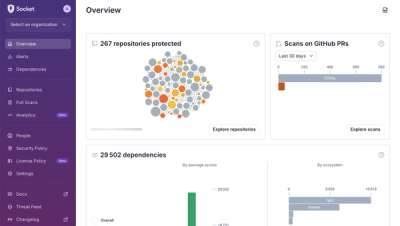
Research
wget to Wipeout: Malicious Go Modules Fetch Destructive Payload
Socket's research uncovers three dangerous Go modules that contain obfuscated disk-wiping malware, threatening complete data loss.
Converts ECMAScript 6 modules to AMD.
$ [sudo] npm install -g es6m2amd
$ m2amd -o out examples
Where "examples" is the directory which will be scanned for files and "out" is the folder, in which the processed files will be stored.
You can include only some of the files in a directory by specifying file pattern via "-i" option, like this:
$ m2amd -o out -i "**/module.js" examples
In this case only file, called "module.js" in whatever sub-directory of "examples" folder will be processed.
Source maps will be generated if you run the program with -m option.
Look for more information in the rest of the options:
$ m2amd --help
Usage: m2amd [options] <folder ...>
Options:
-h, --help output usage information
-o, --output [output folder] output folder to store the generated AMD module. Default: current directory
-i, --include [file patterns] file patterns to process. Default: "**/*.js"
-m, --map [source map] Generate source map
-V, --version output the version number
FAQs
ECMAScript 6 module to AMD converter
The npm package es6m2amd receives a total of 8 weekly downloads. As such, es6m2amd popularity was classified as not popular.
We found that es6m2amd demonstrated a not healthy version release cadence and project activity because the last version was released a year ago. It has 1 open source maintainer collaborating on the project.
Did you know?

Socket for GitHub automatically highlights issues in each pull request and monitors the health of all your open source dependencies. Discover the contents of your packages and block harmful activity before you install or update your dependencies.

Research
Socket's research uncovers three dangerous Go modules that contain obfuscated disk-wiping malware, threatening complete data loss.

Research
Socket uncovers malicious packages on PyPI using Gmail's SMTP protocol for command and control (C2) to exfiltrate data and execute commands.

Product
We redesigned Socket's first logged-in page to display rich and insightful visualizations about your repositories protected against supply chain threats.